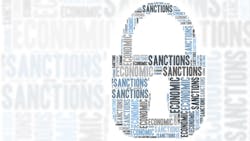International Business and Sanctions: Proceed with Caution
Recent changes in U.S. sanctions law have drastically altered the compliance landscape for companies engaged in international business. During the past year, the U.S. government has taken historic steps to ease sanctions on Cuba and Iran while, at the same time, introducing measures to extend sanctions on Venezuela, cyber criminals, and others. And through enforcement actions against both large and small companies, the government continues to underscore that any company conducting business internationally – whether directly or through manufacturing and exporting to non-U.S. customers – must proceed with caution.
The United States maintains an array of economic sanctions programs against countries, governments, entities, individuals, and even certain vessels. (For instance, do not ship goods on the innocuous-sounding but Cuban-owned Sand Swan, unless you want a visit from the U.S. Treasury Department.)
Certain U.S. sanctions programs are comprehensive, meaning that all or virtually all transactions with the sanctioned target are prohibited. But most sanctions programs are selective, prohibiting only specific transactions with designated sanctions targets.
As a general matter, U.S. sanctions cover the actions of U.S. companies and individuals, wherever located, and any entity in the United States. They also cover a wide range of conduct, including both direct and indirect transactions with sanctioned parties. Thus, for example, a U.S. company cannot refer a prohibited business transaction to its non-U.S. affiliate or distributor.
Cuba
In December 2014, President Obama announced a sea of change in U.S. foreign policy: the United States would take steps to ease sanctions on Cuba. This set the stage for numerous regulatory amendments – some of which were issued as recently as March 15, 2016 – that created several new categories of permitted transactions involving Cuba, including:
- Exports. Probably the most meaningful change for U.S. businesses is that it is now easier to export certain U.S.-origin goods to Cuba. Although a license is still required for most exports to Cuba, some previously restricted categories are now subject to a general policy of approval or case-by-case review. Among the items for which the U.S. government may now issue an export license are those related to aviation safety and telecommunications, to individuals and non-governmental organizations that promote independent activity intended to strengthen civil society, to meet the needs of the Cuban people, and to enable or facilitate subsequent exports of items from Cuba produced by Cuba’s private sector. For example, it is now possible that a U.S. company can obtain a license to export items for – among other purposes – residential construction, public transportation, agricultural production, public health and sanitation, food processing, disaster relief, artistic endeavors, education, and sale to wholesalers and retailers for domestic consumption by the Cuban people. Separately, the U.S. government has removed Cuba from its List of State Sponsors of Terrorism, which means that Cuba is no longer subject to licensing restrictions for products controlled by the U.S. government for anti-terrorism purposes. The removal paves the way for additional export authorizations in the future.
- Telecommunications and Internet-Based Services. To facilitate more efficient telecommunications services between the United States and Cuba, U.S. persons may now establish businesses in Cuba to provide such services and may import Cuban-origin mobile applications and software into the United States.
- Establishing a Business Presence in Cuba. Certain U.S. companies have also been authorized to establish and maintain a business presence in Cuba. Such companies include those that provide authorized telecommunications and internet-based services; exporters of authorized goods; entities providing authorized mail, parcel transmission, or cargo transportation services; and providers of authorized travel services. Relatedly, certain companies – such as those engaged in authorized non-commercial activities, humanitarian projects, or research or educational activities – may now establish a physical presence (such as an office or other facility) in Cuba. And certain items necessary to establish and maintain a physical presence or business presence in Cuba may now be exported to Cuba without a license. Likewise, exporters of authorized items may assemble those items at one of the above-mentioned physical facilities in Cuba.
- Hiring and Paying Cuban Workers. U.S. companies may now engage in transactions to sponsor or hire a Cuban national to work in the United States and to compensate Cuban workers in the United States in a non-immigrant status or pursuant to other authorized non-immigrant travel.
- Vessels on Temporary Sojourn in Cuba. Vessels departing the United States on temporary sojourn to Cuba with cargo for other destinations are now allowed to travel to Cuba without obtaining a license.
- Financial Services. So-called “U-turn transactions” in which Cuba or a Cuban national have an interest may now be conducted through the U.S. financial system. A “U-turn transaction” involves a funds transfer from a bank outside the United States that passes through one or more financial institutions before being transferred to a bank outside the United States. Even under this revised rule, however, such transactions are permitted only when neither the originator nor the beneficiary is a U.S. person or a person in the United States. Separately, U.S. banks may now process U.S. dollar transactions presented indirectly by Cuban financial institutions and may open bank accounts for Cuban nationals located in Cuba for the purposes of receiving payments in connection with authorized transactions.
- Travel. The U.S. government has also liberalized travel to Cuba. Americans can now travel to Cuba for a host of reasons, including in connection with professional research and meetings or to investigate business opportunities (although entering into business arrangements or conducting business that is not otherwise authorized remain prohibited). And while travel to Cuba for tourism is still off-limits, U.S. persons can now travel to Cuba to engage in educational exchanges intended to enhance contact with the Cuban people, support civil society in Cuba, or promote the Cuban people’s independence from Cuban authorities.
The United States has also de-listed a number of Cuban parties from the List of Specially Designated Nationals (SDNs) and Blocked Persons. As a result, U.S. persons are no longer prohibited from engaging in otherwise permissible business transactions with those parties.
Iran
Last year, the United States, the European Union, and several individual countries reached agreement with Iran on the Joint Comprehensive Plan of Action (JCPOA). Under the JCPOA, Iran committed to take certain steps to slow its nuclear development program and make elements of that program accessible to inspectors from the International Atomic Energy Agency (IAEA). In exchange, the United States and other parties to the JCPOA agreed to ease nuclear-related sanctions on Iran.
In early January 2016, the IAEA verified that Iran had fulfilled its initial commitments under the JCPOA, and the United States promptly took steps to ease sanctions on Iran. Importantly, however, nearly all of those steps relate to “secondary sanctions,” which do not apply to U.S. companies. This means that – despite this historic agreement – U.S. companies are still largely prohibited from engaging in business with Iran or the Iranian people.
The JCPOA does, though, offer some limited relief for certain U.S. businesses. First, the U.S. aviation industry stands to benefit from a new favorable licensing policy for the export of certain commercial aircraft and parts and components for commercial aviation in Iran. The U.S. government also now permits non-U.S. subsidiaries of U.S. companies to conduct business with Iran that would be prohibited if conducted by the U.S. parent company. (For the past several years, such subsidiaries have been treated like U.S. companies and, correspondingly, have been subject to the same restrictions as their U.S. parents.) Separately, U.S. parent companies are now authorized to establish or alter their own operating procedures or those of their non-U.S. subsidiaries to ensure that no U.S. persons are involved in any Iran business, and to make available to such non-U.S. subsidiaries certain automated accounting, e-mail, and other internal systems.
As with all sanctions matters, transactions with Iran continue to be very fact-specific. And even when permitted, they may present significant challenges – such as confirming that the Iranian parties involved are permitted partners, finding a U.S. financial institution that is willing to finance the transactions, and other practical difficulties.
Ukraine/Russia
While U.S. sanctions on Russia and Ukraine have vexed exporters since their inception, those sanctions have been extended at only a gradual pace. In January 2015, the U.S. government authorized certain transactions in and with the Crimea region of Ukraine, which is otherwise completely off limits for U.S. persons. And in July 2015, the U.S. government issued an advisory to highlight practices used to circumvent U.S. sanctions on Crimea, including concealing Crimean individual or entity names and addresses from payment messages sent to U.S. parties.
In addition to actions focused on Crimea, the United States has methodically, if slowly, designated dozens of new Russian individuals and entities for sanctions. This appears to have been part of a concerted effort to exert pressure on Russia to reach a diplomatic resolution to the conflict in Ukraine. Yet, it also is not clear how much of an appetite there is to extend sanctions on Russia – at least too dramatically – beyond where things stand currently.
Burma
Another country on which the United States has been easing sanctions is Burma (aka Myanmar). In particular, in December 2015, the U.S. government issued a general license authorizing certain transactions incident to exports of goods, technology, and non-financial services to or from Burma. In large part, this appears to have been an effort to facilitate trade between U.S. and non-sanctioned Burmese parties that tangentially involves a Burmese SDN. (Importantly, transactions to, from, or on behalf of an SDN or an entity in which an SDN has a 50 percent or greater interest remain prohibited.) During 2015, the U.S. government also removed from its prohibited parties lists several Burmese nationals, including Win Aung, the head of Burma’s Chamber of Commerce. It appears that the United States is looking to ease sanctions on Burma while simultaneously maintaining the infrastructure in place to re-introduce them if Burma strays from its current path of democracy and a more market-driven economy.
Venezuela
Unlike with Cuba and Iran, the U.S. government has acted to extend sanctions on Venezuela in the last year – or at least to pave the way for broad sanctions in the future if warranted. In particular, in March 2015, President Obama issued an Executive Order to block the property (and thus generally prohibit U.S. companies from doing business with) persons aiding the Government of Venezuela’s violation of human rights and public corruption. To date, a small number of parties have been designated under this Presidential Action, but the breadth of the Executive Order means that the U.S. government has the authority to ramp up sanctions quickly and decisively if necessary.
North Korea
Throughout 2015, the United States took small but notable actions against North Korea. Early in the year, President Obama issued an Executive Order that authorized the Treasury Department to block all property and interests of:
- An official, agency, or other controlled entity of the Government of North Korea or the Workers’ Party of Korea,
- A person providing support or acting on behalf of the Government of North Korea, or
- A person owned or controlled by a blocked party.
The U.S. government then took steps to slowly ratchet up sanctions against North Korea and the targeted parties by designating the following parties.
- A North Korean individual, shipping company, and vessel. The shipping company was designated for its connection to arms shipments for North Korea’s proliferation activities; the vessel was property in which the newly designated company had an interest.
- Four individuals and one entity for connections to the North Korean Government and North Korea’s weapons proliferation activities. One of the individuals was sanctioned for his role as the North Korean Ambassador to Burma.
- Six individuals and three entities. One individual was designated for involvement in a North Korean bank that facilitated transactions on behalf of SDNs linked to North Korea’s proliferation network. The other five individuals were designated as representatives of a North Korean bank facilitating cross-border transactions involving Syria and Vietnam. Each company designated is a shipping company, and each was designated because it is owned or controlled by a designated company found to have played an active role in shipping – and concealing shipments of – arms and related materiel to North Korea.
Then, in February, President Obama signed the North Korea Sanctions and Policy Enhancement Act of 2016 into law. The Act imposes mandatory designations of – among others – persons who provide certain arms or related services or luxury goods to North Korea or engage in activities to undermine cybersecurity on behalf of the North Korean government. It also authorizes the seizure and forfeiture of vessels or aircraft used to facilitate such activities.
Cyber-Related Sanctions
On the last day of 2015, Treasury announced the publication of new cyber-related sanctions. These were issued pursuant to an Executive Order issued by President Obama, who authorized Treasury to block all property and interests of persons involved in malicious cyber-enabled conduct that may reasonably result in a significant threat to the national security, foreign policy, or economic health or financial stability of the United States.
Download the Latest IndustryWeek Research and Best Practices Collections
In particular, entities and individuals may be designated under these sanctions for activities that involve:
- An effort to significantly harm or compromise critical infrastructure;
- Misappropriating funds or economic resources, trade secrets, personal identifiers, or financial information;
- Knowingly receiving or using trade secrets that were stolen by cyber-enabled devices or measures;
- Disrupting the availability of a computer or network of computers; or
- Attempting, assisting, sponsoring, or providing support for any of the above activities.
Enforcement
Last but not least, enforcement actions continue to serve as an important reminder of how seriously the government takes violations of U.S. sanctions laws. The largest enforcement action in 2015 involved Crédit Agricole Corporate and Investment Bank (Crédit Agricole), a French bank that settled with the U.S. government and the State and City of New York for nearly $800 million. According to publicly available information, the bank committed nearly 4,300 violations of U.S. sanctions on Burma, Cuba, and Iran. It appears that, at least in part, the basis for the huge penalty was the government’s belief that bank personnel knowingly concealed information in messages sent to the United States and thereby caused counterparts in the United States to process these unlawful transactions.
Crédit Agricole is not the only non-U.S. bank that has recently paid a large penalty for U.S. sanctions violations: Commerzbank, a German bank, paid the United States, New York State, and New York City governments nearly $720 million for violations of U.S. sanctions on Burma, Cuba, Iran, and Sudan – and on weapons proliferators. Publicly available information about the settlement suggests that Commerzbank was found to have processed close to 1,600 transactions through U.S. financial institutions involving countries, entities, or individuals subject to various U.S. sanctions programs. Like Crédit Agricole, Commerzbank apparently omitted or failed to include references to those sanctioned persons in payment messages sent to U.S. financial institutions.
A much smaller penalty was paid by PayPal around the same time that Commerzbank was hammered with its nine-digit fine. PayPal agreed to settle with the U.S. Treasury, and pay close to $7.7 million, to settle claims that it had violated a wide swathe of U.S. sanctions programs, including those related to Cuba, Iran, Sudan, Weapons of Mass Destruction, and Global Terrorism. The government claimed that PayPal committed 486 violations by processing transactions with designated parties. Interestingly, the Treasury Department found that PayPal did not have adequate procedures in place to screen and monitor use of its accounts by sanctions targets. Perhaps as a result of that finding, as part of the settlement, PayPal was required to submit, within six months of the settlement agreement, a presentation summarizing current policies and procedures relating to screening transactions and/or customers for compliance with U.S. sanctions regulations.
And Barclays Bank Plc (Barclays) recently agreed to pay $2,485,890 to settle potential civil liability for alleged violations of the Zimbabwe Sanctions Regulations. According to the Treasury Department, Barclays processed transactions totaling $3,375,617 to or through financial institutions located in the United States – including Barclays’ New York branch – for or on behalf of corporate customers of Barclays Bank of Zimbabwe Limited that were owned by an SDN.
Nor have non-financial entities managed to escape sanctions enforcement. Recently, CGG Services S.A. agreed to pay $614,250 to settle potential civil liability for providing services, spare parts, and equipment for oil and gas exploration and seismic surveys in violation of U.S. sanctions on Cuba. Similarly, Halliburton Atlantic Limited agreed to pay a civil penalty of $304,706 to settle alleged violations of Cuba sanctions for exporting goods and services in support of oil and gas exploration and drilling activities in which a Cuban state-owned company had an interest.
And in August 2015, the Treasury Department announced an even smaller settlement – for less than $80,000 – with Production Products, Inc., a provider of HVAC and related machinery and equipment. According to Treasury, the company committed violations of the Weapons of Mass Destruction Proliferators Sanctions Regulations by exporting duct fabrication machines to an entity in China that is designated as an SDN because of its perceived role in weapons proliferation. In imposing such a small – relatively – penalty, Treasury emphasized that while the company failed to exercise an appropriate level of care with respect to U.S. sanctions, the company is a “small family-owned business with only ten employees.” So the government may be at least somewhat sympathetic to small companies with fewer resources to dedicate to compliance – but that sympathy is not boundless.
Finally, the recent issuance of a “Finding of Violation” – without the imposition of a financial penalty – against Johnson and Johnson (Middle East) (JJME) for violations of the Sudanese Sanctions Regulations was notable. Although the Treasury Department found that JJME acted recklessly and that a JJME General Manager was involved in the violations, no penalty was imposed, in part because JJME conducted an internal investigation of the violations and subsequently instituted additional compliance training. This matter highlights the benefits of conducting a robust review of and implementing robust remedial actions in response to any discovered sanctions violations.
As detailed above, the U.S. government has and will continue to use economic sanctions as a weapon of foreign policy. This presents challenges to any company, regardless of size, doing business internationally: a country or entity that appears to be a good trading partner may be sanctioned – literally overnight – and all business with the party must be immediately halted. And even a small company that manufactures and/or exports fairly innocent products can find itself in the U.S. government’s crosshairs.
But sanctions can also present competitive advantages for those who are paying attention. Careful analysis of permitted transactions in a country, or with a particular party, that might otherwise be considered off-limits can lead to international opportunities that a more casual observer does not recognize. Exporters should bear that in mind as they continue to watch sanctions developments in 2016.



